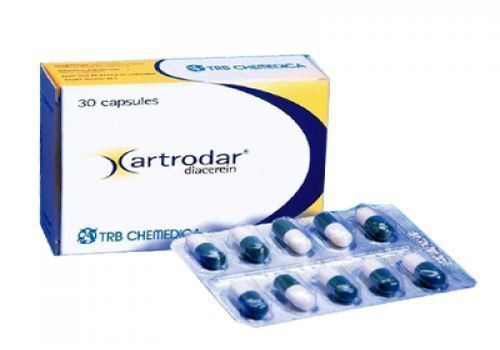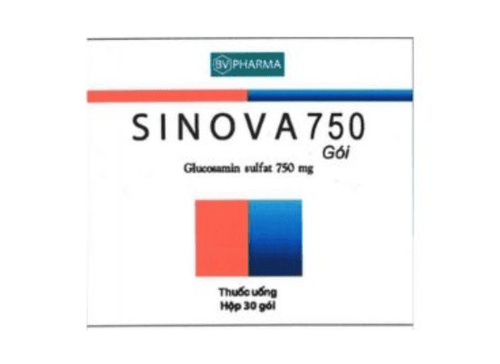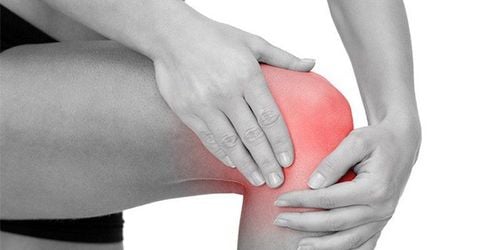This is an automatically translated article.
Diahasan medicine is often prescribed by doctors to treat osteoarthritis or degenerative joint conditions that cause pain to patients. In order for the active ingredients in Diahasan to maximize their therapeutic effects, patients need to use the drug as recommended by their doctor.
1. What is Diahasan?
Diahasan drug belongs to the group of non-steroidal anti-inflammatory drugs, relieves pain and fever and treats gout or osteoarthritis. Diahasan is manufactured by Hasan-Dermapharm Co., Ltd. - Vietnam and is widely distributed throughout the country.
Currently, Diahasan is made in the form of hard capsules and packed in boxes of 3 blisters x 10 tablets, 5 blisters x 10 tablets or 10 blisters x 10 tablets. Each Diahasan tablet contains the main active ingredient, Diacerein, 50mg, along with some other excipients just enough.
Active ingredient Diacerein is a derivative of Anthraquinone, with moderate anti-inflammatory ability. When taking the drug in high doses, gastric irritation and inhibition of prostaglandin synthesis were not observed. In general, the effects of Diacerein are usually slow and appear after about 30 days of treatment, reaching an effect after about 45 days. The effect of Diacerein will be significantly increased when combined with NSAIDs.
In vitro tests have shown that Diacerein possesses the following properties:
Inhibits the production of Interleukin 1. Inhibits phagocytosis as well as the migration of macrophages. Potentially reduces collagenolytic activity.
2. Indications and contraindications to using Diahasan
2.1. Indications for use of the drug Diahasan Diahasan is usually prescribed by doctors to treat symptoms of osteoarthritis, degenerative joint disease or a number of related diseases.
2.2. Which subjects are contraindicated to use Diahasan? Do not use Diahasan in the following cases:
Patients with a history of allergy or hypersensitivity reaction to the active ingredient Diacerein, derivatives of Anthraquinone or any of the ingredients in the drug. Diahasan is contraindicated in pregnant or lactating women and children under 15 years of age. Diahasan is contraindicated in patients with a history of liver disease or liver disease. Diahasan should not be used in people who are being treated with antibiotics because the drug can affect the intestinal microflora. Diahasan is contraindicated in patients with a history of intestinal disorders, especially irritable bowel syndrome. Do not treat with Diahasan in patients with unexplained abdominal pain. Diahasan is contraindicated in patients with pseudo-obstruction or intestinal obstruction. Do not use Diahasan for people with inflammatory bowel disease, such as Crohn's disease or ulcerative colitis, ...
3. Dosage and how to use Diahasan
3.1. Dosage of the drug Diahasan The following is the recommended dose of Diahasan that patients can refer to:
Dosage for adults: Take 2 tablets / day, divided into 2 times a day and take with meals. Dose for patients with renal impairment: Reduce the dose of Diahasan by half if the patient has a creatinine clearance of less than 30ml/min. 3.2. Diahasan drug instructions Diahasan is made in the form of capsules, so the drug will be taken orally at the dose recommended by the doctor. Patients should take Diahasan with meals to reduce the impact on the gastrointestinal tract.
Before taking Diahasan, patients need to carefully read the instructions for use written in the prescription leaflet enclosed with the medicine box or follow the instructions of a specialist doctor. Patients should also avoid overdosing on Diahasan or regularly missing doses as this can affect how the drug works and even increase the risk of side effects.
4. Possible side effects when using the drug Diahasan
During treatment with Diahasan, patients may experience some unwanted side effects below:
Gastrointestinal symptoms such as abdominal pain, diarrhea or flatulence. Frequent urination. Dehydration, electrolyte disturbance. Changes in the mucous membrane of the colon-rectum, also known as melanoma of the colon. Increase liver enzymes. Jaundice, abdominal pain, yellow eyes, confusion or skin itching. Itching, eczema or rash on the skin. Urine is dark in color. Symptoms of hepatobiliary disorders, acute liver damage, hepatitis. If any of the side effects mentioned above occur, the patient should promptly inform the doctor so that measures can be taken to prevent serious complications.
5. What should be noted and cautious when using Diahasan?
5.1. Things to be careful when using Diahasan drug During the time of using Diahasan drug, patients should note and be cautious of some of the following:
Regular intake of Diahasan can lead to diarrhea, dehydration and dehydration. hypokalemia. Particular caution should be exercised when Diahasan is used concomitantly with diuretics because of the possible risk of hypokalemia and dehydration. Taking Diahasan may increase serum liver enzyme levels and cause acute liver damage. Before taking Diahasan, you should tell your doctor about any medical conditions you have, such as advanced liver disease, a cause of liver damage, or a history of liver disease. Liver damage should be closely monitored and caution should be exercised when taking the drug with other drugs that are harmful to the liver. Ideally, patients need to limit alcohol consumption during treatment with Diahasan. Do not use Diahasan if you notice elevated liver enzyme levels or have symptoms that suggest liver damage as well as liver toxicity. In the drug Diahasan contains Lactose, avoid using for subjects with rare genetic disorders such as glucose - galactose malabsorption, Lapp lactose deficiency or Galactose intolerance. The drug does not affect the patient's ability to operate machinery, drive, do heavy work or work at height. Store the medicine in a dry place, below 30 degrees Celsius, avoid exposure to direct light and high humidity. Keep medicine in a high place, avoid areas near children's play areas to avoid accidental ingestion. Always check the expiration date before taking Diahasan, if the medicine has expired, it should be discarded and disposed of properly according to the advice of your doctor. 5.2. What other medicines does Diahasan interact with? Here are some drugs that can interact with Diahasan:
Avoid taking Diahasan with laxatives. Diahasan should not be used concurrently with drugs containing oxides, salts, calcium, magnesium, aluminum hydroxide because these drugs may reduce the absorption of active Diacerein. If necessary, these drugs should be adjusted to another time, preferably more than 2 hours after taking Diahasan. Wine or alcoholic beverages. In order to avoid the risk of drug interactions, patients should inform their doctor if they are taking other medications or supplements at the moment. Even the use of vitamins, minerals or herbs should be reported to the doctor to minimize the risk of interactions between Diahasan and other drugs.
Above is information about Diahasan drug effects, dosage and use notes. To ensure safety for your health and maximize the effectiveness of your treatment, you need to take Diahasan exactly as directed by your doctor.
Please dial HOTLINE for more information or register for an appointment HERE. Download MyVinmec app to make appointments faster and to manage your bookings easily.













